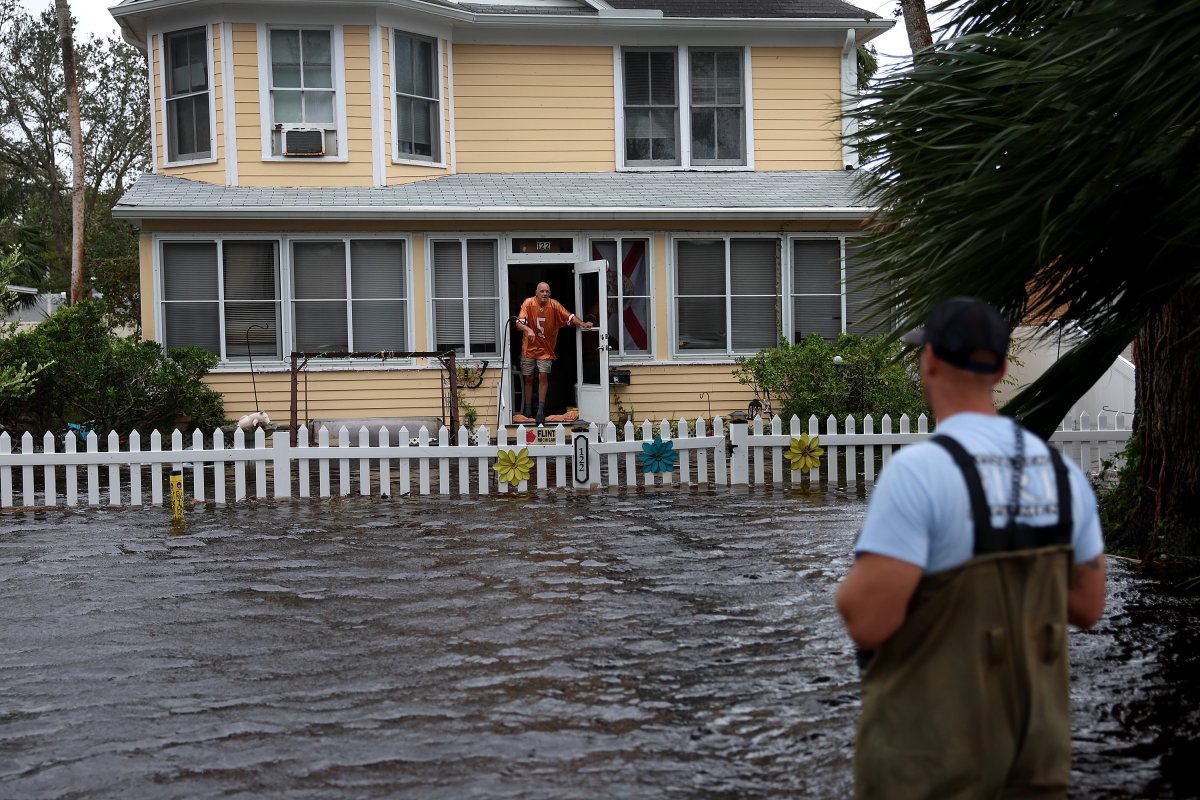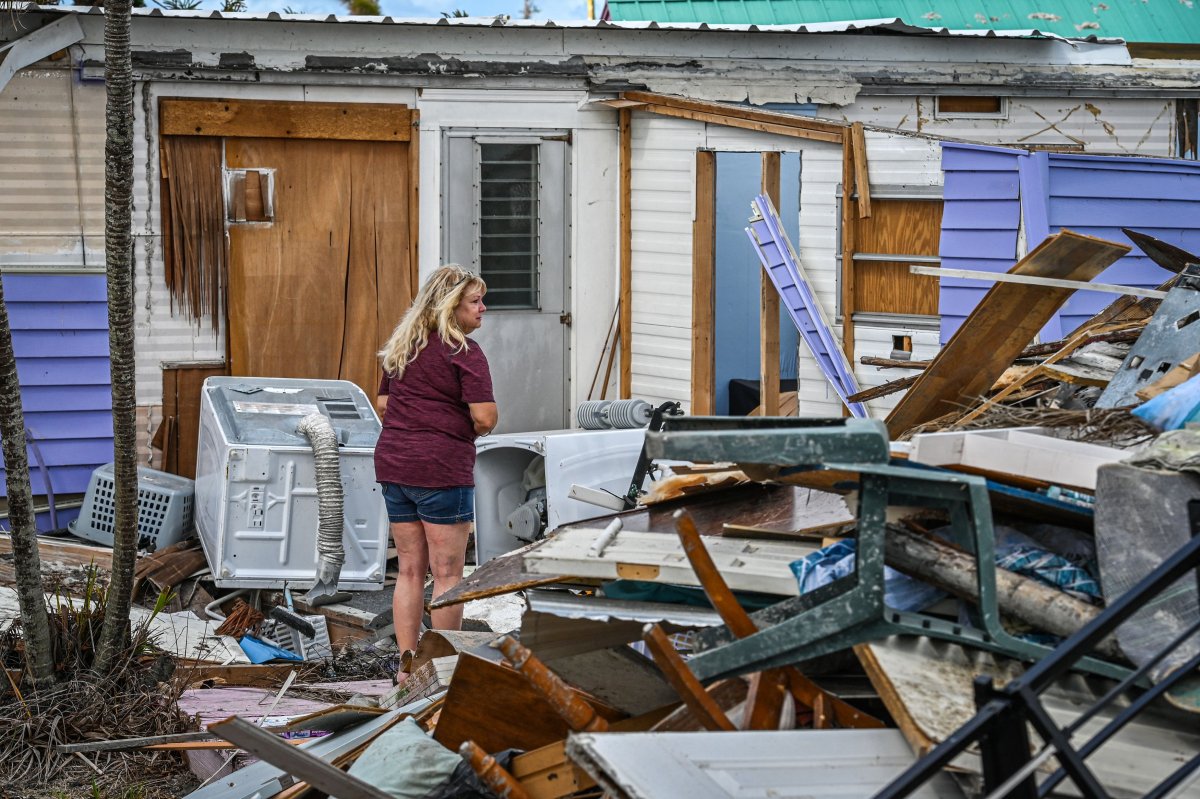The rising cost of home insurance in Florida is pushing many residents to give up on coverage partially or altogether, selling their homes and even considering moving out of the state, readers told Newsweek. Some have already taken the plunge and left the state that they once considered heaven on Earth.
Florida’s insurance premiums are the highest in the country, according to a recent study by the Insurance Information Institute (Triple I), and have tripled in the past five years. Residents are currently paying on average more than $4,200 per year, while the national average is $1,700, according to Triple I.
Skyrocketing costs are made worse by an ongoing insurance crisis that has seen 15 major insurers, including Farmers, deciding to leave the state over the last year. Many cited the increased risk of extreme weather events in the state, which scientists attribute to global warming, as one of the reasons for pulling out of Florida.
Joe Raedle/Getty Images
A ‘Dream’ That Turned Into a ‘Nightmare’
While Florida continues to be an attractive destination for Americans dreaming of moving somewhere sunny and with relatively low taxes, the increasing unaffordability of home insurance is leading some to move out of the state.
According to the U.S. Census Bureau, an estimated 275,666 people left Florida in 2022—nearly 23,000 people every month. Most, according to the bureau, relocated to places like Georgia (46,884), North Carolina (42,301), Tennessee (36,200), South Carolina (31,456) and Texas (29,975).
Joan Keenan is a retired Illinois teacher who moved to Florida two years ago with her husband, who retired from fire service, to live their “retirement dream.” But “the insurance in Florida is a nightmare,” she told Newsweek.
“Due to the insurance rates going up, we have a different financial dream these days,” Keenan said. “We live in a small one-bedroom condominium (890 sq. feet) on the intercoastal waterways of Treasure Island,” she added. “Since we moved here our Association fees have gone from $446.00 dollars a month to $656.00.”
Linda—who preferred to kept her last name anonymous—was born and raised in Brooklyn, moved from New Jersey to Florida in 1983 and thought she had “died and gone to heaven.” But in August this year, Linda sold her house in Palm Beach County and moved to Pennsylvania, after getting tired of her homeowner’s insurance “not being renewed and being moved to Citizens, not to mention the price increases every year.”
This, in addition to “the worry about the ever-increasing threat of more devastating hurricanes every year, got to be too much,” Linda told Newsweek. “Politics, in Florida, also added to my desire to get out,” she said.
Linda now lives in Pennsylvania. “I didn’t know how long the seller’s real estate market and astronomical prices were going to last, so when the right opportunity presented itself, I jumped on it,” she said.

Joe Raedle/Getty Images
Insurance premiums have climbed as construction costs—which are taken into consideration when determining how expensive it would be to rebuild a home once destroyed—have also risen by a staggering 40 percent since 2017, and because of the excess litigation going on in Florida.
While the state represents about 7 percent of the U.S. homeowners’ insurance market, Florida produces 75 percent of all litigation from homeowners, Charles Nyce, department chair, and Dr. William T. Hold, associate professor of risk management and insurance at Florida State University, told Newsweek.
According to analysts, premiums are expected to continue surging in the next year as the severity and frequency of extreme weather events are expected to increase.
What Does This Mean for Florida?
While the number of people moving out of Florida might be small now, a demographic downward trend could have a significant impact on the state’s economy.
“Florida is a growth state and its whole economy depends to a large extent on population growth and job growth,” Lesley Deutch, a managing principal of John Burns Real Estate Consulting based in Florida, told Newsweek.
“Historically, net in-migration has been incredibly important to the state, it’s always had one of the top population growth in the country,” she continued.
“If that does reverse, that would really hurt a lot of the service industries and a lot of the job growth that we’re seeing in Florida. Our whole economy in Florida is really based off of this churn of new people coming in, that’s how it’s always been. And I think if it were to reverse, it would be very difficult economically for the state,” she concluded.
Deutch is not that pessimistic about the future of the state though. “Insurance costs are a real problem, affordability is a real problem, but I would argue that it is a problem around the country,” she said. “We have a few hurricanes in Florida and then insurance costs really skyrocket, but usually the government steps in or the private industry does, and they find a temporary solution until the next cycle. So we’re hoping that will be the case.”
Beyond that, rising interest rates have a lot of residents, regardless of where they are, deciding against moving altogether. “People are staying put in their homes because they have an under 6 percent mortgage. The higher mortgage rates are really forcing people to stay in their homes, and people aren’t moving nearly as much as they were in the past.”
Rather than moving out of the state, Deutch has observed people moving out of bigger cities to go to next-door markets that are more affordable, with Lakeland attracting a big number of people leaving Orlando, and Port Lucie attracting those moving out of Palm Beach County, both an hour away.
Why Are People Selling, Dropping Their Coverage, Or Moving?
Mike Derham, who owns a three-bedroom holiday home on Melbourne beach with his family, told Newsweek that the house now costs $11,000 per year to insure. “We will be selling up,” he said.
Scott R. Borchert said his insurance doubled in 2023, going from $2,760 to $5,200. He had to change insurance companies and drop his sinkhole coverage to get it down to a more manageable $3,200. He said he has never had a claim on the property in the last 19 years, but their insurer dropped him on short notice because his roof was over 20 years old and they believed he hadn’t done enough maintenance—a claim he denies.
Debbie Giusto, a Floridian resident for 64 years, told Newsweek that “the exorbitant prices she’s being forced to pay” are making her consider moving to Georgia.
“If home insurance rates continue to climb then we, along with many others, will be forced to move to Georgia,” she said. “My brother and one of my sisters have already moved, one to Alabama and one to Georgia. We have all grown up in Florida and any and all of our family are here in Florida,” she continued, adding that “someone needs to step up” and fix the situation.

GIORGIO VIERA/AFP via Getty Images
Many Floridians mentioned how the increased price of car insurance, as well as home insurance premiums, is causing them to face unaffordable costs.
Verne Johnson, who had lived in Florida for 40 years and saw his neighborhood in the Vista Lakes subdivision flooded by Hurricane Ian in 2022 decided to move after seeing the cost of their home and two car insurance skyrocket.
“Moving at any age is difficult, but we are retired and felt the cost of insurance in Florida had no end in sight,” he told Newsweek. “Property taxes, tolls, population explosion, high heat most of the year, increasing utility costs, crime, a governor who dislikes Walt Disney World, the entire quality of life was no longer worth the cost of waiting each year for another hurricane to strike, and blow your life away. We moved.”
Gwen—who preferred to keep her last name anonymous—told Newsweek she moved to Florida 30 years ago and she loves it, but her home insurance is now making up 20 percent of her income. “It’s simply impossible to afford,” she said. “It’s really sad to have to move out of Florida, but it’s priced out for anyone but the upper upper class.”
Greg Salisbury said he’s selling his house and moving to Georgia by the end of November. “High cost of insurance, hurricanes, floods, sinkholes, high crime and illegal drugs. Just to name a few reasons. Also my insurance company, Farmers, is leaving the state. Made a bad mistake moving here,” he told Newsweek.
“All in all it’s a hellscape many of us are seriously considering escaping,” Kevin Ghiloni, a resident of Merritt Island who has lived in the same house since 1989, told Newsweek. He said that finding insurance for his home built in 1957 has become “nearly impossible.”
“We are outta here as soon as humanly possible,” said born-and-raised Floridian Teresa Mace, lamenting rising costs in the state.
Some mentioned Governor Ron DeSantis and his politics as one of the reasons contributing to their desire to leave the state, while others said they appealed to him, calling his office to complain of the unaffordable cost of home insurance, but were never contacted back.
“We the people are out until the election rolls around again, then the false promises start,” said Jana Keely, a 67-year-old resident of Fort Myers who said is retired but looking for work and signed her email “respectfully & disappointed and not knowing what to do next.”
“I heard Governor DeSantis on the news the other night, saying, if you don’t like this country, then don’t live here. That’s the first thing I’ve ever agreed with him on,” said Edward Armstrong, who moved to Florida from Chicago in 2009.
Others told Newsweek they considered moving out of the state, but they’re staying put because they cannot think of another place to move to or think they cannot afford it.
“I have thought about leaving the state but don’t know of another place where I want to live. For now, I plan on staying,” a reader told Newsweek.
In response to a request for comment by Newsweek, a spokesperson for DeSantis’ said that understanding Florida’s current situation requires a knowledge of the sector’s history in the state.
“Florida’s property insurance market has been chaotic since 2007, when bad public policy forced insurers to flee Florida, and the state’s insurer of last resort, Citizens, ballooned,” Jeremy Redfern said. The spokesperson added that DeSantis has been tackling the issue of excessive litigation in the state, passing SB 76 in 2021, a bill “which significantly reformed the litigation environment in Florida by changing the way attorney fees are awarded in disputed insurance cases.”
Redfern added: “The Governor has consistently pressed the legislature to enact substantive insurance reform. In addition to pushing for the attorney fee reform in SB 76, in 2019, Governor DeSantis pushed for reform of assignment of benefit claims and signed HB 7065 into law. He has also appointed over 100 judges and 5 Supreme Court justices who have reduced frivolous litigation.”
DeSantis also passed SB 2D, which enacted “pro-consumer measures to help alleviate rising insurance costs, increases insurance claim transparency, and cracks down on frivolous lawsuits which drive up costs for all Floridians.”
Redfern said: “Even the most aggressive reforms will take time to affect the insurance industry. The 2021, 2022, and 2023 legislative efforts will be effective, and we already see evidence that the market is improving.”
Uncommon Knowledge
Newsweek is committed to challenging conventional wisdom and finding connections in the search for common ground.
Newsweek is committed to challenging conventional wisdom and finding connections in the search for common ground.


